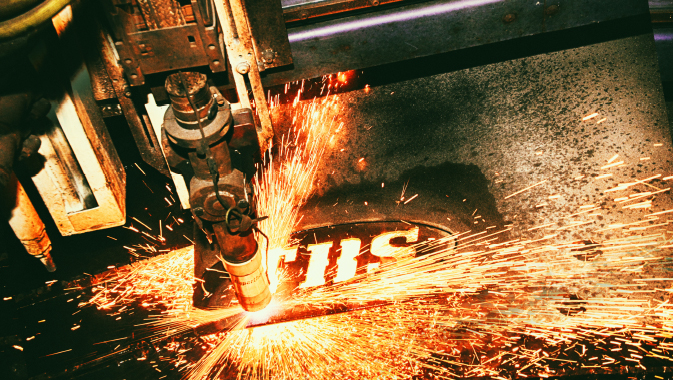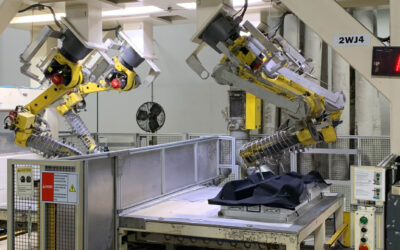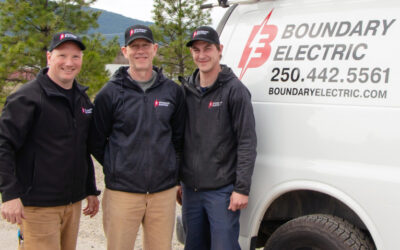The Canadian Shield, the hardest, most abrasive rock in Northern Ontario, runs its course throughout the assets of the mining industry. From Scoop trams to Excavators, it grinds its toll into buckets and blades of every mining enterprise.
Representing a significant investment for the mining industry, buckets, ground engaging tools, and their associated wear products come at a considerable expense to each property.
With Ross and Paul Woodward’s founding of The Bucket Shop (TBS) in 1994, their mission was simple: bring extended lifecycle and reduce the overall cost of ownership through innovative proprietary designs and a lifetime of experience in the earthmoving and manufacturing sectors.
Over the years The Bucket Shop has evolved from its humble beginnings of two employees in a small Quonset hut to the development of its new state-of-the-art 85,000 square foot manufacturing facility. The new facility was designed with material handling in mind, equipped with nine cranes ranging from 15 to 70 Tons and automated electric carts to carry parts to their associated manufacturing bays. Material handling comes at a great cost; therefore, the development of this assembly line ensures the utmost efficiency.
In addition to their material handling improvements, the Woodward family made significant investments in tooling. The new plant boasts both a New Machitech 100’ CNC Plasma Cutter and a Metfab 770 Ton press brake. With the full intention of serving their mining partners, the team needed to tool up to meet demand, and these two equipment assets were necessary investments when dealing with the large iron required to efficiently mine the area.
The 100’ Plasma Cutter was specifically designed to handle custom sized steel sheets to support the local mines. This tool works 18 hours a day and has an appetite of roughly 80 tonnes of steel plate per month. All work begins at the CNC controlled pattern cutter.
“It’s an amazing piece of technology that allows us to do a lot of amazing things, and it keeps us very productive,” comments Jamie Pouw, Market Development Manager. “It’s the start of basically every single project that comes in.”
Bucket Shop benefits
There are significant benefits for all companies to be doing business with The Bucket Shop.
Along with manufacturing new attachments, the company is known for its innovative ability to extend the lifecycle of attachments. This leads to much lower replacement costs, improved safety, reduced energy consumption, increased productivity, and other benefits.
The team at TBS has introduced unique ways to prolong the lifespan of buckets and other costly purchases. These include such engineered solutions as a lip system and heel shrouds.
Designed to work with different scoop-tram, loaders and excavator bucket configurations, the lip system – mounted on the existing lip of the bucket – combines “425 brinell castings coupled with strategically placed 700 brinell specialty alloy inserts,” Extremely durable, the lip is easy to install, boosts production, reduces downtime, and extends lifecycle by two to three times.
Value-added services
TBS offers a full suite of Fleet Management services. TBS sends assessment technicians to mine sites monthly, to measure wear percentage and check product performance. Its trained technicians provide full reports on every aspect of your bucket. These reports contain complete repair recommendations and alert customers to take worn assets out of service for overhaul and eliminate emergency downtime.
“The physical audit gives us the evidence we need to report back to the company that they are on track,” says Pouw. “What that does for the mining company is give them information [about] when the machine is scheduled to be taken out of service for maintenance and determine the lifecycle on its wear components. The audit service we provide helps the mine in its maintenance forecasting, not only for production impact, but for financial impact.”
In addition to serving its mining clients, TBS uses the audit data collected at various mining properties to further improve and innovate its castings and buckets line. All data and wear attributes are gathered and studied to continually improve the product offering. The company prides itself on its ability to meet its customers’ needs through the development of their line.
“Our Fleet Management services become a win/win situation for both TBS and our clients. All data collected is used to further improve our products to ensure we supply the better built bucket,” says Curtis Westcott, General Manager.
Community leaders
To better serve its mining customers, The Bucket Shop’s manufacturing facility includes the massive CNC pattern cutter, 27 welding stations, 10 cranes, and a fully equipped machine shop, and the company is presently involved in a 20,000 square foot expansion including a maintenance facility, warehouse, abrasive blasting and two paint booths.
TBS’s expansion was endorsed by Timmins Mayor George Pirie. “The Bucket Shop is a great example of the quality partners we have in the City of Timmins,” the Mayor said in a statement, praising the 100 employee-strong business.
“They’re a local firm, obviously, that has decided to grow in Timmins and build their new expanded facilities in Timmins. They have got a great business there and we want to ensure they continue to grow… they are a great corporate citizen. It’s a pleasure to have them in the community.”
Working for people and impacting the skilled labour shortage
With staff ranging from welders and millwrights to office workers, TBS faces the challenges of many similar industries, namely constrained supply of skilled personnel in the trades.
This is especially problematic in Northern Ontario, which is seeing a declining population and an aging workforce, with many young people choosing to migrate to bigger cities. To address this, TBS is taking steps to spur new interest in the skilled trades and is partnering with the local Indigenous people.
Working, as it does, with the reserves and First Nations of Northern Ontario, The Bucket Shop was approached last year by Aboriginal Women in Mining (now Keepers of the Circle), which works with companies in the mining sector to generate training initiatives. A partnership was created between the two groups to build a training centre for Aboriginal women to expose them to the industry. This July heralded the fourth group of women to graduate from a welding curriculum provided by the Canadian Welding Bureau (CWB).
Pouw is proud of the program he was charged to oversee. “We proved the success of that pilot project, and I think it’s a great way to take an underrepresented group, build a skilled trade ability, and keep them in the mining sector to help with today’s labour challenge,” he says.
With a focus on both products and people, The Bucket Shop continues to expand, and looks forward to developing a new, highly skilled workforce in Timmins to complement its successful line of wear products and services. According to Westcott, “Our recent expansion, continued product development and investment into training opportunities are all part of our overall strategy to ensure sustainability in an extremely competitive marketplace.”













